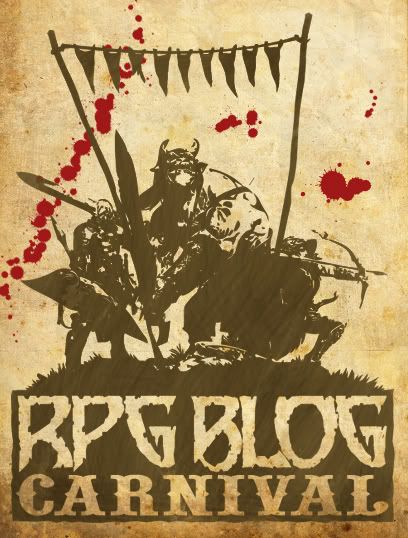
This month's RPG Blog Carnival is being hosted by Evil Machinations and is being used as a continuation of last month's discussion on how expanding the hobby. So you've gone out, you've grabbed those new gamers from the wilds of your local Dunkin Donuts or Movie Theater. What do you do now? How do you involve them in the game? How do you explain the game to them? Most importantly, how do you stop them from running screaming for the hills, or the cops, or the cops on the hills? Well, let's go over three very basic steps you can use to help teach them gaming, and get them involved.
Step 1: One on One Time
The first step you want to take with a new player is to make sure that you are one on one with them. Gamers are a helpful lot, or at least they want to be, and so when someone is confused they'll just jump in and explain things. This is not what you want when trying to bring someone new to the table because what starts as people intending to be helpful, quickly turns into 4-6 people trying to teach the same basic thing, each in their own way, to one confused, nervous, and now likely frightened person.
Instead, just find a night - preferably before game night - to talk to the person you are bringing in to the game in a one on one format. Bring only the base books, a PhB and Dungeon Master's guide for something like D&D, or just the core rules you need. The idea is not to bury them in "all the cool options" but to start simply. If you can, bring a pre made character and just go through a quick one on one session with them. Go over the basics of the game, how you determine a dice pool, how you roll, what you roll, what determines success or failure, and all the other basics.
The idea is that you get them in a non-threatening environment where they can ask questions without feeling stupid. They get a basic feel for the game, and even if they don't remember everything they'll remember having heard it so their questions will be more specific.
Step 2: Keep The First Character Basic
This seems like a no brainer, but I can't tell you how many times I've seen someone's first character be a complex and advanced character. A magic user, a cleric, or something that used advanced mechanic combos for more power. You want to keep the first character very basic, as basic as you can. Sure it may lose out a little in power, but you don't care about that now. You care about the person having a good time and understanding what is going on.
Give a new player an advanced and complex character, and they aren't going to learn how to play, they're going to learn how to ask other people to explain things on their sheet to them. They're going to flub and flounder, and then feel awkward because they don't "get it". Once they start getting embarrassed you've pretty much lost, because people don't really like being embarrassed. So you really are better off going with something simple for them. A straight up 'class' or something that is otherwise very mechanically straight forward.
You do this so the person can learn faster, gear the character towards the mechanics the person seemed to like in your one on one session. Yes, I am assuming you are helping them build this character, because why wouldn't you? Help them into the game, help them make the character, and help them keep it basic and simple so they can enjoy the game without getting lost in everything.
Step 3: Assign a Helper
If you're not GMing the game, than this should be you. You're their friend, you're the one who is bringing them into this, you are very likely their safe spot in the game, so you should be helping them. If you are GMing, assign the person a helper. Someone who is not socially awkward and knows the game system. Someone who can handle helping someone while playing their character. Have this person sit near the new player (and keep the new player near you as well). This way, when things get confusing there is someone close by for the person to ask for help. They can ask quietly, not embarrassing themselves, and not disturbing the game (thus preventing even more embarrassment).
Step 4: Make It Fun
This really is the most basic one, but I'm going to point it out here anyhow. Make the game fun for them, and make sure they have fun. Give them a moment in the spotlight, but don't focus completely on them either. You want to show them what the hobby is like, how it can be fun, and all that other great stuff about it. So, do your best to maximize fun and minimize embarrassment as they learn the game and you'll very likely have yourself a new gamer in no time.
No comments:
Post a Comment